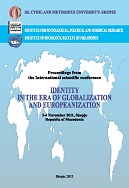
HOW INSTITUTIONAL COMMUNICATION WORKS: THE EU ENLARGEMENT AND THE DEMOCRATIC TRANSITION IN THE BLACK SEA REGION STATES
HOW INSTITUTIONAL COMMUNICATION WORKS: THE EU ENLARGEMENT AND THE DEMOCRATIC TRANSITION IN THE BLACK SEA REGION STATES
Keywords: European Union; enlargement; communication; institutions; democracy; democratization; free market.
The process of enlargement of the European Union has been approached in many studies and from different perspectives in the past years. This article focuses on the idea of institutional communication between the candidate countries and the EU and takes into account two dimensions relevant for explaining the impact of a foreign actor on the democratization process at the internal level: the structural factors that emphasize economic development and the institutional elements needed to establish a sustainable democracy. This article analyzes the relationships between the EU enlargement policies and the democratic and free market performances of those states from the Black Sea Region that are closer to the EU in ideas and/or expressed for a long period the willingness to join the European structures.
More...
